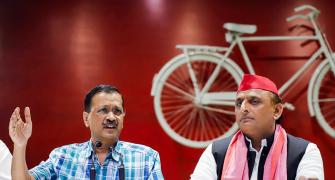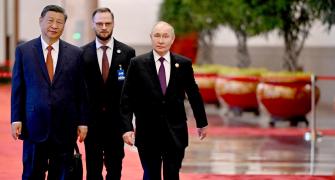Finance Minister P Chidambaram is understood to have indicated that the government was willing to lower taxes if exemptions were phased out, as part of efforts to spur investments and growth.
During the pre-Budget meeting, industry captains have responded positively to the suggestions of the finance minister and said they were not averse to the phase-out of exemptions if tax rates were brought down.
Chidambaram told industrialists that the government was not in favour of tinkering with the tax rates when a section of the industry demanded lowering of corporate tax rates from the present 35 per cent.
But he promised rationalisation of tax structure, improving compliance and making administration more efficient.
Chidambaram also said he was in favour of early introduction of value-added tax but wanted to ensure that once the date was fixed, it became "irrevocable".
The minister said the government was committed to implement the measures spelled out in the Common Minimum Programme over a period of five years and added that he would accept the suggestions of the industry to ensure 7-8 per cent GDP growth.
Industrialists said a climate should be created to ensure an even higher growth of 10 per cent during 2004-14.
Federation of Indian Chambers of Commerce and Industry president Y K Modi and M K Sanghi, chief of Association of Chambers of Commerce demanded that corporate tax should be lowered to 30 per cent from the present 35 per cent, excise duties to 16 per cent and tax net be spread wider to cover 15 crore taxpayers from the present 3.3 crore.
The finance minister was happy that perhaps for the first time in a pre-Budget meeting there was no "rent-seeking" suggestion from the industry, Confederation of Indian Industry president Anand Mahindra said.
But the industry did demand measures to create conducive environment for bolstering investment, he added.
Industrialists were also unanimous in demanding measures to create more jobs, but some wanted flexibility in labour laws in new projects, he said. India Inc also wants measures to step up investment in food processing and housing while treating water conservation as a national mission.
FICCI president opposed cess on all central taxes to fund education, saying when taxes go up, growth in revenue collection comes down.
Industrialists pressed for liberal regime to step up FDI by three-fold to $15 billion annually.
Federation of Indian Export Organisations president M Rafeeque Ahmed said unless the regime is further liberalised, FDI cannot increase in exports sector.
Modi said the country needs investment to the tune of Rs 1,50,000 crore (Rs 1,500 billion) and it cannot come as FDI only. So, there is a need to revive the country's financial institutions.
Subsidy should be better targeted, Modi said, adding if the subsidies were paid directly to the poor the bill would be Rs 15,000 crore (Rs 150 billion) instead of the present Rs 25,000 crore (Rs 250 billion).
FICCI favoured divestment of PSUs, but said the money should go to a separate trust from which the government can carry out expenditure for education and health.
Chief economic advisor Ashok Lahiri said the government was committed to accord top priority to the farm sector and would consider the demands of agriculturists for stepping up farm credit, consolidation of agri-schemes and revamping cooperatives.
Modi said to attain 10 per cent GDP growth, agriculture growth should be doubled from 2.1 per cent to four per cent, industrial growth must record growth of 11 per cent from the current 6.5 per cent and services sector must register 11 per cent growth from 8.4 per cent.
To achieve a four per cent agriculture growth per annum investments in the farm sector should be raised to Rs 60,000 crore (Rs 600 billion) and permission to farmers to sell products anywhere by abolishing Mandi Tax, Agriculture Produce and Marketing Act and Essential Commodities Act, he said.
Modi said dis-savings of public sector at negative 1.9 per cent should be raised to two per cent of GDP while corporate investments should be raised to Rs 25,000 crores per year.
The FICCI chief asked the finance minister to carry out divestment and raise Rs 25,000 crore per annum as the resources generated through privatisation is vital for the development of rural India.
All loss making PSUs should be privatised while divestment should be up to 74 per cent in all non-strategic profit making companies and up to 49 per cent in all strategic profitable companies.
The investors' confidence should be restored by selling PSU shares and attracting new equities through deduction in computation of total income by 50 per cent, FICCI said.
On fiscal reforms, Chidambaram was asked to take steps to implement Geethakrishnan Committee on Expenditure Reforms and Fifth Pay Commission and subsidy be given to the poor only while deregulating administered interest rate on small savings and provident fund.
FIEO chief said the government should continue with certain tax benefits mainly to small and medium exporting units and reduce transaction costs.
Ahmed proposed necessary relief to exporters of brass-artware, silk textiles, made-ups, handmade carpets, stone articles etc, which are in the small and cottage sectors.
On Duty Entitlement Pass Bood scheme, he said the government should make certain amendments for including it in the Income-Tax Act so as to benefit exporters mainly from southern and western parts of the country.
PHD Chamber of Commerce said the country is in need of a long-term taxation policy to bring 'continuity, stability and certainty' in the system.
Referring to the indirect taxes, the chamber suggested that the Budget should take initiatives to 'lessen the burden on the manufacturing sector'.
"At present, the combined incidence of central and state levies in India comes to around 35 per cent while the domestic tax burden in other countries is around 18 per cent."
This, the chamber said, was a major cause of restricted market growth and the reducing compliance level in the country.
Concerning exports, the chamber suggested that phasing out of the deductions on earnings from the exports should be considered.






